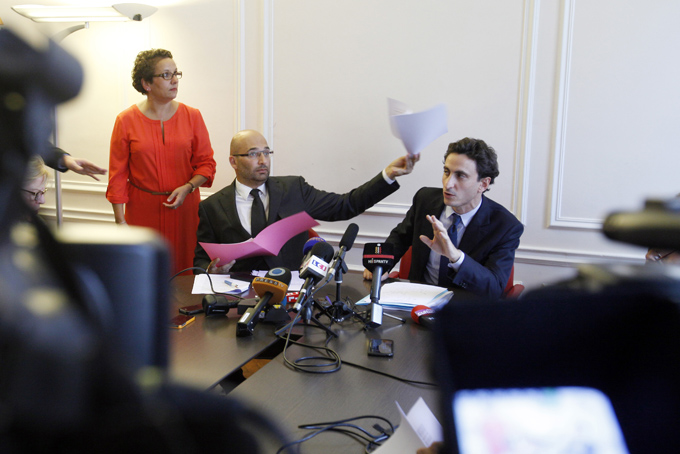
Lawyers acting for the plaintiff, Slim ben Achour, left, and Felix de Belloy talk during a press conferene in Paris, Wednesday, Oct. 2, 2013. (AP Photo/Michel Spingler)
PARIS (AP) — A French court on Wednesday rejected claims that police identity checks on 13 people from minority groups were racist, saying officers didn’t overstep any legal boundaries.
The decision upended an unusual bid to rein in law enforcement officers often accused of racial profiling. The verdict followed a one-day trial in July billed as the first of its kind in France, and a sign that long-silent minorities are increasingly finding their voice. Lawyers for the plaintiffs pledged to appeal — up to the European Court of Human Rights if need be.
The French ruling comes amid a public furor over stop and frisk policies of the New York Police Department. But in that case, being closely watched here, a judge has ruled against NYPD practices said to discriminate against blacks and Hispanics.
Anti-racism groups say that non-white French — particularly blacks or those of Arab origin — face routine discrimination that diminishes their chances of finding jobs, getting into nightclubs and carving out a place for themselves in mainstream society.
Such discrimination, they contend, also subjects minorities to humiliating public identity checks.
The plaintiffs — who range from students to delivery personnel — sought 10,000 euros ($13,000) each in the case. Their lawyers also wanted changes in the law that would require police to provide written reports of ID checks and spell out “objective grounds” for conducting the checks.
“The most obvious consequence(of the decision) is that police in this country… have the right to discriminate,” lawyer Slim Ben Achour said afterward. “There is a blank check for police to continue these practices.”
The court upheld the state’s argument that the ID checks aren’t illegal under French law.
A person who considers an identity check abusive must prove the action was a gravely serious offense, the lawyers said, quoting the judgment. They noted this is almost impossible since there is no trace an identity check took place.
A 2008 French law to fight discrimination is applicable only in professional relations “uniting an employer to his employee,” the court said, adding that it wasn’t within their purview to change laws.
Judith Sunderland of Human Rights Watch said in a statement the court was, de facto, affirming that France can ignore international norms with “a single message: the state is always right, and the police have the green light to discriminate.”
The plaintiffs in the case weren’t immediately available for comment.
Lawyers for the plaintiffs said they were watching similar legal battles in New York and hoping they might weigh on French policy.
The New York Police Department has been at the center of an uproar over gratuitous stop-and-frisk practices. A New York judge last month appointed an academic advisory council made up of law professors to help develop reforms to the city police department’s stop and frisk practices.
Judge Shira Scheindlin found in August that the city discriminates against minorities with current stop and frisk practices. The city has appealed that ruling.
New York police have stopped, questioned and sometimes patted down about 5 million people over the past decade, mainly Black and Hispanic men. The judge ruled that the policy violated civil rights and ordered a monitor to oversee changes to the policy including officer training, supervision and paperwork.
In France, the law allows for widespread police checks on people deemed suspicious. Opponents say police have too much discretion.
“Through this decision, French justice says that the law of equality … basically does not apply to French police and we are pretty shocked by that,” lawyer Felix de Belloy said.
“I would not say that this decision legalizes ethnic profiling, but clearly the judges closed their eyes to ethnic profiling,” he added.
French authorities have rejected a proposal to make police write out reports for each person they control, making the acts traceable. However, Interior Minister Manuel Valls plans to require police to wear identifying numbers on their uniforms by the end of the year.
A study conducted in Paris by France’s National Center for Scientific Research and the Open Society Justice Initiative, which backed the legal action, has shown that blacks have six times more chance of being checked by police than whites, and those of Arab origin have eight times more.
Discrimination against France’s minorities became a national issue after fiery riots in 2005 spread through suburban housing projects where many residents or their forebears come from former French colonies in Africa. The unrest laid bare the simmering anger by minorities isolated from mainstream life. What minority youth said was gratuitous stopping and frisking fed the rancor. Youth from housing projects and police have notoriously poor relations.
The French legal action was also backed by the Union of French Lawyers and the Stop Racial Profiling association.
___
Follow Elaine Ganley at https://twitter.com/Elaine_Ganley